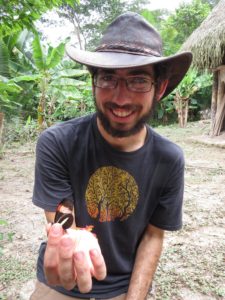Tuesday May 9th
07:30 PM
Broad-scale hybridization in Heliconius Butterflies
MCZ 101, 26 Oxford Street, Harvard University
Nate Edelman
Harvard University
 Hybridization among closely related species has important consequences for the processes of speciation and evolution, and for their study. For example, it can obscure evolutionary histories or enable adaptation through introgression. I’m interested in how these actions play out in nature, and will explore an extreme case study of hybridization between two species of Heliconius butterflies in South America. Heliconius elevatus and H. pardalinus range throughout the Amazon basin, but these species have strongly different ecological characteristics, most strikingly their mimetic color patterns. Hybrids are at a distinct disadvantage, as their intermediate color pattern does not mimic other toxic butterflies in the region. However, genomic analysis revealed that Amazonian H. elevatus and H. pardalinus populations are extremely closely related, almost as if they were a single large population. Through a combination of field and molecular studies, we attempt to unpack this relationship and identify the evolutionary history and forces at play.
Hybridization among closely related species has important consequences for the processes of speciation and evolution, and for their study. For example, it can obscure evolutionary histories or enable adaptation through introgression. I’m interested in how these actions play out in nature, and will explore an extreme case study of hybridization between two species of Heliconius butterflies in South America. Heliconius elevatus and H. pardalinus range throughout the Amazon basin, but these species have strongly different ecological characteristics, most strikingly their mimetic color patterns. Hybrids are at a distinct disadvantage, as their intermediate color pattern does not mimic other toxic butterflies in the region. However, genomic analysis revealed that Amazonian H. elevatus and H. pardalinus populations are extremely closely related, almost as if they were a single large population. Through a combination of field and molecular studies, we attempt to unpack this relationship and identify the evolutionary history and forces at play.
The talk is free and open to the public. The meeting is readily accessible via public transportation. Parking is available in the Oxford Street Garage with advance arrangement, as described here, or (usually but not always) at spaces on nearby streets. Everyone is also welcome to join us for dinner before the talk (beginning at 5:45 PM) at the Cambridge Common, 1667 Mass Ave., Cambridge.
CEC meetings are held the second Tuesday of the month from October through May. The evening schedule typically includes an informal dinner (5:45 to 7:15 PM) followed by our formal meeting (7:30 – 9:00 PM). The latter begins with club business and is followed by a 50 minute entomology related presentation. Membership is open to amateur and professional entomologists.



